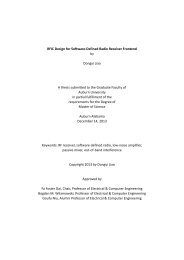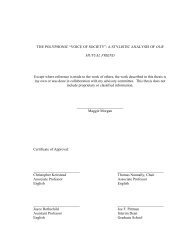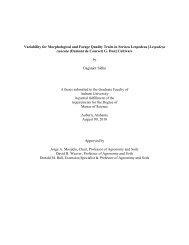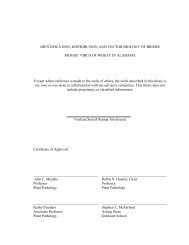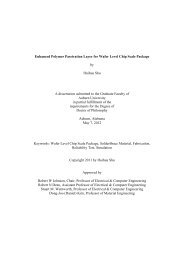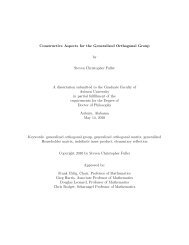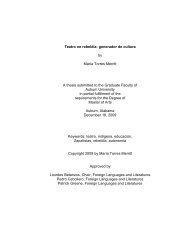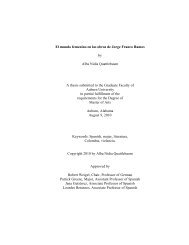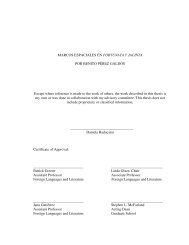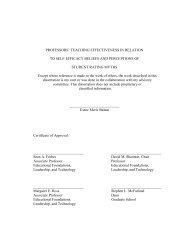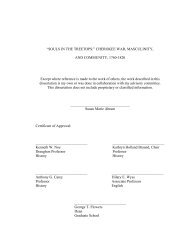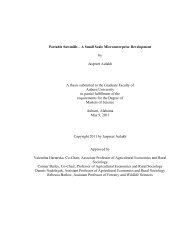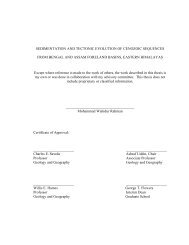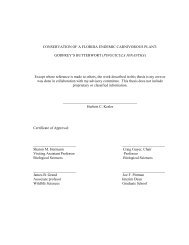the trouble with gender in othello - Auburn University Electronic ...
the trouble with gender in othello - Auburn University Electronic ...
the trouble with gender in othello - Auburn University Electronic ...
Create successful ePaper yourself
Turn your PDF publications into a flip-book with our unique Google optimized e-Paper software.
<strong>with</strong>out her fa<strong>the</strong>r’s permission that is problematic. The fact that she not only<br />
chooses for herself, but chooses a man not of her “clime, culture (or) degree”<br />
(III.iii.263) can not be discounted. Her disobedience and will<strong>in</strong>gness to disrupt<br />
<strong>the</strong> social order (by marry<strong>in</strong>g outside her class, culture, and even race) are both<br />
edges of <strong>the</strong> sword that Iago uses, and <strong>the</strong>refore both must be discussed.<br />
In <strong>the</strong> early modern m<strong>in</strong>d, it is supremely unnatural for a white woman to<br />
want a black man 2 . That Desdemona should so “err from nature” would be<br />
<strong>in</strong>dicative of her ‘unnatural’ <strong>the</strong>refore, wrong, <strong>gender</strong> performance. The very<br />
fact of her miscengentistic marriage, both <strong>with</strong><strong>in</strong> <strong>the</strong> script of <strong>the</strong> play and <strong>the</strong><br />
societal script that existed <strong>in</strong> <strong>the</strong> culture <strong>in</strong> which <strong>the</strong> play was crated, makes<br />
Desdemona deviant from her <strong>gender</strong> performance. That <strong>the</strong> belief that<br />
Desdemona’s desire for a man not of her “clime, complexion, and<br />
degree”(III.iii.263) would have been deemed deviant was deeply <strong>in</strong>gra<strong>in</strong>ed <strong>in</strong><br />
<strong>the</strong> psyche of <strong>the</strong> males <strong>in</strong> <strong>the</strong> play is seen by <strong>the</strong> fact that it is O<strong>the</strong>llo himself<br />
who first comments, when Iago first beg<strong>in</strong>s to plant <strong>the</strong> seeds of Desdemona’s<br />
disobedience <strong>in</strong> his m<strong>in</strong>d: “I do not th<strong>in</strong>k but Desdemona’s honest.[…] And yet,<br />
how nature err<strong>in</strong>g from itself-‘’(III.iii.259, 263). Iago, see<strong>in</strong>g <strong>the</strong> open<strong>in</strong>g, jumps<br />
<strong>in</strong> immediately, driv<strong>in</strong>g home <strong>the</strong> ‘fact’ that Desdemona’s rejection of any man<br />
“of her own clime, complexion, and degree, whereto we see <strong>in</strong> all th<strong>in</strong>gs nature<br />
tends—Foh! One may smell <strong>in</strong> such a will most rank, foul disproportion,<br />
thoughts unnatural”( III.iii.263-266).<br />
15



